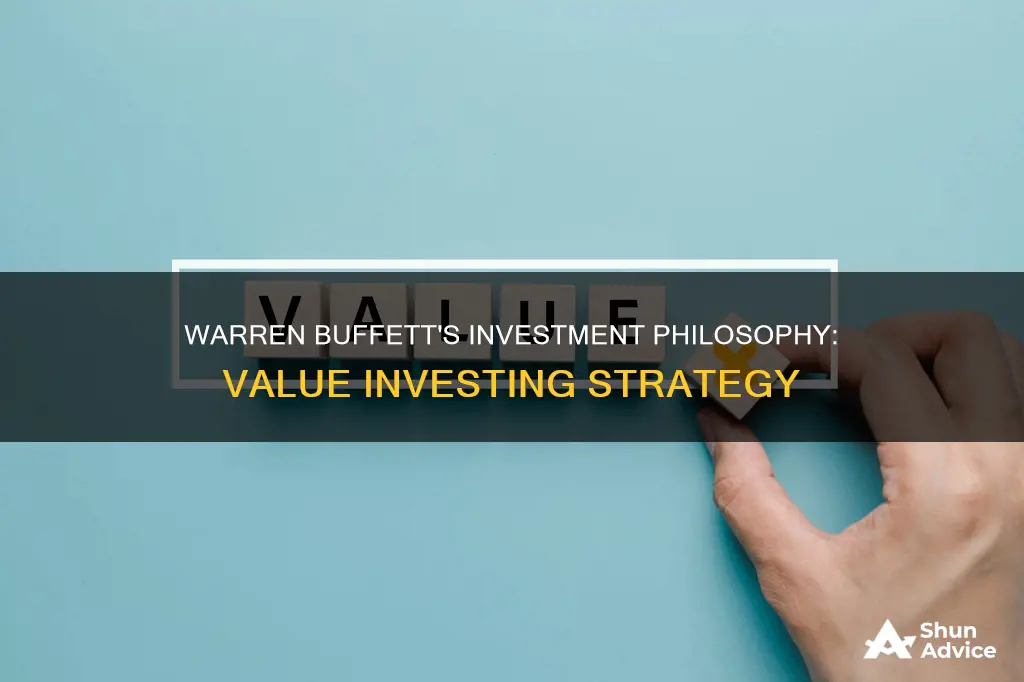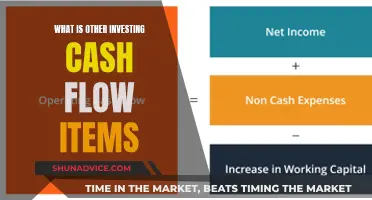
Warren Buffett is one of the world's most successful investors, with a net worth of over $100 billion. His investment strategy has been honed over decades, but at its core, it is not complicated. Buffett is a value investor, looking for undervalued companies with strong growth potential and investing in them for the long term. He focuses on the fundamentals of a business, its overall health, and its long-term intrinsic value rather than short-term earnings or stock prices. He also prioritises a margin of safety, ensuring he pays less than a company's intrinsic value to protect himself from losses. Buffett's other key principles include buying businesses, not stocks, focusing on quality, and taking a long-term approach.
| Characteristics | Values |
|---|---|
| Investment approach | Long-term |
| Investment philosophy | Value investing |
| Investment selection | Companies with strong potential for growth |
| Investment focus | Companies with a durable competitive advantage |
| Investment mindset | Long-term |
| Investment strategy evolution | From "cigar butt" investing to a more long-term approach |
| Investment rules | Never lose money, focus on the long term, know what you're investing in |
| Investment advice | Don't lose money, be fearful when others are greedy, wait for the right pitch |
| Investment type | Productive assets |
| Investment criteria | High-quality businesses, capable managers, sensible price |
| Investment selection criteria | Strong economics, business understanding, durability, competitive advantage |
| Investment valuation | Don't pay too high of a price |
| Investment style | ""Cigar butt" approach, paying fair prices for excellent businesses |
What You'll Learn

Buffett follows the Benjamin Graham school of value investing
Warren Buffett is known for his success as an investor and has a net worth of over $100 billion as of February 2023. His investment strategy is centred around the principle of value investing, which involves finding undervalued companies with strong growth potential and investing in them for the long term. This approach was pioneered by Benjamin Graham, whom Buffett studied under at Columbia University. Graham is widely considered the father of value investing and his teachings had a significant impact on Buffett's investment philosophy.
Buffett's value investing strategy involves looking for securities with prices that are unjustifiably low based on their intrinsic worth. He focuses on the overall health of a company rather than the intricacies of the stock market, considering factors such as company performance, debt, and profit margins. He also takes into account whether a company is public, its reliance on commodities, and how cheap it is. By buying stocks in undervalued companies, Buffett aims to take advantage of their potential for future growth.
Buffett's investment philosophy also includes a long-term focus, where he avoids short-term thinking and instead zeroes in on the long-term growth potential of the companies he invests in. He is known for his frugality and patience, waiting for the right opportunities to arise rather than overpaying for companies. This discipline, combined with his deep understanding of the industries he invests in, has contributed to his success as an investor.
In addition, Buffett prioritises a margin of safety in his investments. He looks for companies with a durable competitive advantage, such as a strong brand, high barriers to entry, or a large and loyal customer base. He also focuses on the quality of the underlying business, seeking companies with strong economics that generate cash flow for their owners. Buffett's investment strategy, rooted in value investing and his own insights, has made him one of the most successful investors of all time.
How Much Cash Should You Hold Now?
You may want to see also

Buffett looks at companies holistically, not stock market intricacies
Warren Buffett is one of the world's most successful investors, amassing a fortune of over $100 billion. His investment strategy is centred around the principle of value investing. This approach involves looking at companies holistically, rather than focusing on the intricacies of the stock market.
Buffett subscribes to the Benjamin Graham school of value investing, which involves seeking out securities with prices that are unjustifiably low based on their intrinsic worth. This means that, rather than fixating on stock market fluctuations, Buffett takes a broader view, assessing companies as a whole. He considers various factors, such as company performance, debt, and profit margins, to identify those with strong potential for growth.
Buffett's strategy involves identifying undervalued companies with strong fundamentals and a durable competitive advantage, such as a strong brand, high barriers to entry, or a loyal customer base. He then invests in these companies for the long term, holding onto them for years or even decades. This long-term focus allows him to take advantage of compound interest and gives the companies he invests in time to grow and generate substantial returns.
Buffett's approach to investing is also characterised by his discipline and patience. He is known for his frugality and willingness to wait for the right opportunities, avoiding overpaying for companies. He famously advised investors to "wait for the right pitch", emphasising the importance of waiting for a business that you understand and that is offered at a reasonable price.
In summary, Buffett's investment strategy revolves around identifying and investing in undervalued companies with strong growth potential, focusing on the long term, and maintaining a disciplined and patient approach. By looking at companies holistically and prioritising value investing, Buffett has achieved remarkable success and established himself as one of the greatest investors of all time.
A Beginner's Guide to Investing with eToro
You may want to see also

He focuses on company performance, debt and profit margins
Warren Buffett is one of the world's most successful investors, amassing a fortune of over $100 billion. His investment strategy is focused on company performance, debt, and profit margins.
Buffett subscribes to the Benjamin Graham school of value investing, which involves seeking out securities with prices that are unjustifiably low compared to their intrinsic worth. He looks at companies holistically, considering their overall potential rather than the intricacies of the stock market.
Here's a deeper look at how Buffett approaches investing, focusing on company performance, debt, and profit margins:
Company Performance
Buffett evaluates company performance by assessing return on equity (ROE). He calculates ROE by dividing net income by shareholder's equity and comparing it to other companies in the same industry. Buffett also considers historical ROE, looking at the past five to ten years to analyse performance trends.
Debt
When it comes to debt, Buffett favours companies with minimal debt. He looks at the debt-to-equity (D/E) ratio, preferring businesses that rely more on shareholders' equity than borrowed money for growth. A lower D/E ratio indicates a stronger financial position.
Profit Margins
Buffett understands that a company's profitability depends on having good profit margins and consistently increasing them over time. He calculates profit margins by dividing net income by net sales and reviews historical data to identify trends. A high and steadily increasing profit margin indicates a company's ability to effectively manage expenses and generate profits.
By focusing on these key aspects of company performance, debt, and profit margins, Buffett is able to make informed investment decisions, seeking out undervalued companies with strong growth potential.
Angel Investing: A Nonprofit's Guide to Success
You may want to see also

Buffett is a long-term investor
Warren Buffett is a long-term investor. He is not interested in short-term gains and is known for holding onto companies for years or even decades. He famously said, "If you aren't willing to own a stock for 10 years, don't even think about owning it for 10 minutes". This long-term mindset has allowed him to take advantage of compound interest and given the companies he invests in time to grow and generate substantial returns.
Buffett's investment strategy focuses on value investing. He looks for undervalued companies with strong potential for growth and invests in them at a reasonable price. He is not concerned with the intricacies of the stock market but instead focuses on the overall potential of the company as a whole. He considers factors such as company performance, debt, and profit margins when evaluating potential investments. Buffett also looks for companies with a durable competitive advantage, such as a strong brand, high barriers to entry, or a large and loyal customer base.
Buffett's long-term investment approach is centred around finding great companies at a fair price. He is not interested in trendy investments but instead focuses on investing in companies with a proven track record of success and strong growth potential. He is also known for his frugality and discipline, waiting patiently for the right opportunities to arise rather than overpaying for companies. This discipline, combined with his deep understanding of the industries he invests in, has contributed to his success as an investor.
Buffett's long-term focus also extends to his own development as an investor. He emphasises the importance of investing in yourself to achieve success. This includes making prudent financial choices and increasing your knowledge in the areas in which you seek to participate. Buffett himself spends a significant amount of time reading and reflecting, believing that knowledge compounds over time.
Starbucks' Investment Strategies: Secrets Behind Their Success
You may want to see also

He is a contrarian investor
Warren Buffett is a contrarian investor, famously advising people to "be fearful when others are greedy and greedy when others are fearful". This means that he takes advantage of market crashes to buy companies at a discount, knowing that their value will eventually recover. He also avoids overpriced companies, even if they are popular with other investors, knowing that their value is likely to decrease over time.
Buffett's contrarian approach is also reflected in his advice to "wait for the right pitch". He believes that investors have the advantage of being able to wait for the right opportunity, rather than investing in something they don't fully understand or that is overpriced. This ties in with his focus on investing in companies he fully understands and avoiding trendy investments.
Buffett's contrarian approach also extends to his view on index funds. Despite making his fortune as an active investor, he acknowledges that most people will be better off investing in a broadly diversified low-cost index fund, allowing them to profit from the progress of capitalism.
In addition, Buffett's approach to investing in productive assets rather than speculative assets can be seen as contrarian. He argues that speculative assets like gold or cryptocurrencies don't produce anything for their owners, so their price is dependent on what someone else is willing to pay. In contrast, productive assets like stocks, real estate, bonds or farmland can generate value over time.
Overall, Buffett's contrarian approach to investing has been a key factor in his success and has contributed to his reputation as one of the greatest investors of all time.
HSA Investment or Cash: Which Option is Better?
You may want to see also







